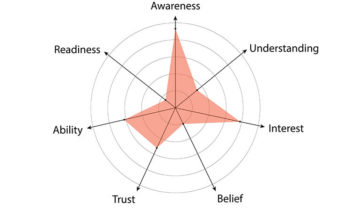Keeping It Real: Why Clients Value Authenticity
The Authenticity Debate
The word itself means to be genuine and not copied or fake. In the case of people and not things, it means that a person’s action reflects their true nature, as in, “Matt Damon’s Boston accent in Good Will Hunting is authentic,” or “Ralph’s outrage at the prison reform was authentic, a function of him having been mugged.” That is the way Nate strikes me. He’s authentic because he seems completely unaffected, a person who is not trying to be something he’s not. Turns out this quality is magnetic in Nate and can be in others as well. Nate makes reference to a debate going on in academic circles around this notion of “authentic leadership.” On the one hand, Bill George, the former CEO of Medtronic who is now a professor at Harvard Business School and the author of Authentic Leadership, says,
The debate over which form of leadership works seems settled, in my view. Most leading companies globally are focusing on developing “authentic leaders” within their ranks. Executive courses at Harvard Business School in authentic leadership development are oversubscribed and expanding every year. As the Harvard Business Review declared in January 2015, “Authenticity has emerged as the gold standard for leadership.”
The essence of authentic leadership is emotional intelligence, or EQ, as articulated by Daniel Goleman. People with high IQs and low EQs can hardly be called authentic leaders. In contrast to IQ, which basically does not change in one’s adult lifetime, EQ can be developed. The first and most important step on this journey is gaining self-awareness.
On the opposite coast, Jeffery Pfeffer, Stanford Graduate School of Business’ long-time professor and author of Leadership BS, takes the opposite position:
The last thing a leader needs to be at crucial moments is authentic.
One of the most important leadership skills is the ability to put on a show, to act like a leader, to act in a way that inspires confidence and garners support — even if the person doing the performance does not actually feel confident or powerful.
Leaders need to be true to what the situation demands and what the people around them want and need. Each of us plays a number of different roles in our lives, and people behave and think differently in each of those roles, so demanding authenticity doesn’t make sense.
So, is authenticity a critical attribute or not? And why is it that so many in the consulting and professional services field talk about how authenticity is a critical component of successful business development? A clue might lie within the definition and use of the word authenticity, which has a strange relationship with itself.
Is Authenticity Defined by Its Absence?
In the interview, Jacob mentions job applicants who “tout their authenticity” and Nate reacts violently. “The first thought that [comes to mind when I hear that] is how inauthentic they are.” It is almost as if this word doesn’t like itself. The mere mention of authenticity is proof positive you don’t have it. We’re a lot more comfortable with the concept in its negative form: “That guy was a fake.” “There was something about how she presented herself that seemed affected.” “It felt like he had an ulterior motive.” “She was telling us what she thought we wanted to hear.” “They seemed phony.” “Too slick by half.” “A poseur.” “Rehearsed.” Academic Jacob Golomb writes in his book, In Search of Authenticity, “Authenticity is a negative term… [best] discerned in its absence.” I agree. A better approach might be to look at the word functionally and ask why do clients so consistently say they look for authenticity in those with whom they are considering working?
Why Clients Value Authenticity
Clients value authenticity primarily because it is useful to them. Perceiving whether or not someone is authentic helps clients make better buying decisions. Here’s why:
- Credibility – Clients buy from those they respect and they think can do the job. If someone comes across as shifty-eyed and inauthentic, it makes would-be clients wonder if all the case studies, endorsing quotes, and talk of a track record might not be true. Inauthenticity feels like someone is presenting a face to us they want us to see and saying things we want to hear. That raises the hair on the back of our neck. As Kellie Crantz, EMC’s vice president of talent strategy and development says, “Everyone filters. As human beings, we’re wired to know when someone is being disingenuous.”
- Trust – Clients buy from those whom they believe have their best interests at heart. When someone seems overly affected or slick, it makes clients wonder if the expert might have an ulterior motive. Professional services are credence goods. Buyers have to have an extra measure of trust before engaging with would-be partners because the potential consultant is the only expert in the room and is charged with both diagnosing the problem inside a company and suggesting a fix. Because the prospect for self-dealing and conflicts of interest exist in this sort of arrangement, clients are desperate for clues on whether or not they can trust the consultant.
- Leadership – When clients engage with an expert, they’re looking for someone to tell them the truth. They’re surrounded sheep. They need someone who is unafraid to speak truth to power. But if someone seems inauthentic, will they have the guts to speak their mind even if it is unpopular? Clients register inauthenticity as a fundamental lack of confidence. If you are more concerned with how you are being perceived than being who you are, that suggests in the future, the tool you will reach for first will not be honest assessment.
- Interestingness – Originals are always more interesting than copies. As humans, we’re drawn to people who are interesting. Perhaps it is because we find interesting people entertaining but maybe it is also that we sense interesting is code for different and only in different is pressure put on orthodoxies and innovation produced. Or maybe it is even more elemental – that as humans we crave diversity as evolutionarily advantageous and our best defense against constantly evolving threats.
The Seven Elements of Business Development
Being Authentic
Nate is right. Being authentic is an important way in which we can drive engagement with those with whom we can most help. But how do we increase our authenticity quotient? We know we need to be authentic when we meet with would-be clients, but we also know that the surest road to inauthenticity is to try too hard to be authentic. It feels like a Catch-22.
A few tips to authentically be more authentic:
- Listen first. Actors are taught to not just memorize and deliver their lines but to react to the other actors on the stage. Not to memorize or rehearse these reactions, but to really listen to the other characters as they speak and then to really react. Listen to those with whom you are interacting. Be present. Don’t half listen as you think about what you are going to say next, but track the meaning they are trying to communicate as it is happening.
- Be real. If you call on a potential client and it is snowy and miserable out, it is okay to say, “Man, it is freezing out,” as you shudder to kick off the cold. We’re taught to keep the personal separate from the professional, but letting the personal bleed into the professional is better even if it doesn’t seem relevant. “How’s it going? Thanks for coming in.” “I’m actually doing great. My wife and I just celebrated our 40th wedding anniversary. Hard to believe!” Says, Andrea Procaccino, Chief Learning Officer of New York-Presbyterian Hospital, “An authentic leader shows you who they are as a person, and they focus on engaging others.”
- Don’t equivocate. If you think something is not true, don’t soften your delivery in an effort to avoid offense. “I have to tell you, I wouldn’t migrate from Dropbox to Office365. Microsoft doesn’t quite have their act together yet.”
- Show you are self-aware. Self-deprecating humor signals you know your limitations and aren’t in the business of presenting yourself (or your business case) as something it is not. “As you can see from my grey hair, I am no spring chicken, but I’ll tell you, I am clever enough to surround myself with smart young people and they tell me that Millennials prefer crowd-sourced recommendations.”
- Make your values transparent. We make decisions based on what we think is important. Don’t shy away from letting clients know how you think about right and wrong. “I’d love to help you on your go-to-market strategy, but I am working with Kroger right now and that feels like a conflict. Let me recommend another firm. I’ve worked with them before and know they are very good.”
Authenticity Isn’t Free but It’s Worth It
In the end, being authentic is critical to successfully engaging with would-be clients, but you can’t game it. You are who you are. Either you are comfortable in your own skin and don’t mind putting it out there, or you’d rather hide behind a heavy coat of who-you-think-they-want-you-to-be. It is your choice. Clients, though, are clear: They want to do business with partners who are the real deal. Which means that authenticity comes at a cost. Here is Nate on the subject.
The issue of authenticity comes down to fit. If your authenticity is a square peg and the problem is a square hole, great. If the hole is instead a circle, as a consultant, do you change (fake the authenticity of being a circle), convince the client the hole is a circle (what most do), or take a pass on the gig and look for a square hole?
What [consultants] need to understand is that authenticity will win you some relationships and those relationships have a much better chance of becoming deep and ongoing, but it will cost you some relationships, too, as people won’t warm up to you. I had a student evaluation say, “Nate will not be everyone’s cup of tea, but this was by far the best class I have taken in this program.” They are right. A certain percent of each class doesn’t really “get me.” There is a cost to [authenticity].
Do not let that deter you, though. As Nate says, “The benefits [of being authentic] far outweigh the costs. And being authentic is both easy and helps you sleep better at night.”




